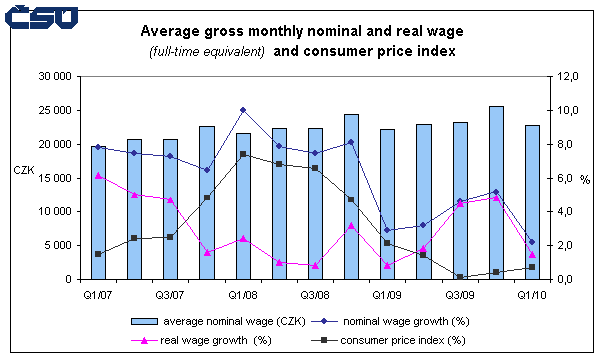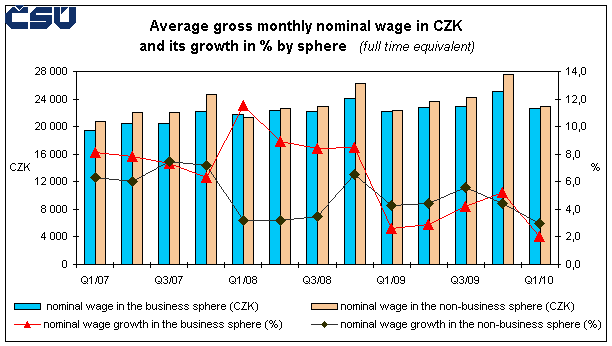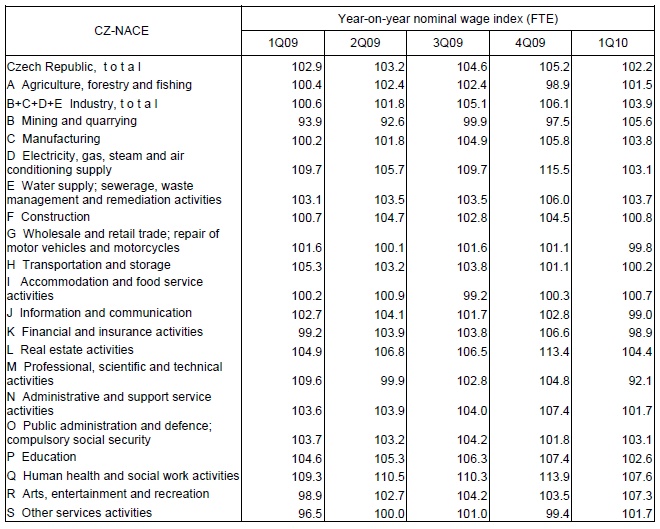Analysis of the development of average wages of employees - 1 quarter
08.06.2010
Code: q-3134-10
The results show that the labour market in the Czech Republic is still strongly affected by worldwide economic recession. The development is influenced by y-o-y drop of the registered number of employees (FTE): in Q1 2010 the total of 176 thousand employees (4.5%) were made redundant. In Q4 2009, the loss was even higher, but now the crisis has an impact on comparative base too.
The biggest loss of jobs was registered in industry where 103 thousand employees, i.e. 8.2% were dismissed, and in construction by 17 thousand (i.e. 6.5%). The drop in the number of employees was also registered in market services, the biggest number of jobs was lost in 'wholesale and retail trade; repair and maintenance of motor vehicles' where 22 thousand of employees, i.e. 4.3% were dismisses and, relatively biggest numbers of redundant employees were recorded in 'accommodation and food service activities’ where over 11 thousand of jobs (8.6%) were lost.
Total drop of employment in the business sphere by 184 thousand (5.7%) is partly slowed down by a moderate growth of employment in the non-business sphere by 8 thousand (1.1%) which is mainly due to the relocation of part of the dismissed to social beneficial work.
In wages we observe gradual weakening of structural influences which markedly distorted indices to a paradox growth of the average per one employee in the last year; now, the indices depict the actual wage development more exactly: increase of wages of employees was rather exceptional. The growth of average nominal wages (2.2%) was the lowest since 2000 when comparable time series begin.
The real wage development, besides the nominal wage growth, was affected also by slowly growing price level (inflation) measured by the consumer price index. In Q1 2008 the inflation hit its top (7.4%) and has been falling since to reach its minimum in Q3 2009 (0.1%), in Q4 it increased slightly (to 0.4%) and in Q1 2010 inflation increased by 0.7%.
The total real wage in Q1 2010 increased, y-o-y, by 1.5%. The business sphere saw an increase of the real wage by 1.3%, y-o-y, while the non-business sphere recorded a 2.3% growth.
Graph 1

Graph 2

The minimum wage showed no changes since January 2007 and accounts for CZK 8 000.
* * *
Over the year 2009, according to structural wage statistics, we observed transformation and expansion of wage distribution. Lower wages in blue-collar jobs slowed down or decreased while higher salaries of non-manual workers, especially managers, continued to grow. The structure of employees recorded considerable changes as well. They markedly influenced the average wage indices, which lost their information value to a certain extent. Similar is the situation for the current period when it is rather difficult to describe a little chaotic development only on the basis of average values.
In terms of individual economic activities (CZ-NACE sections) a radical year-on-year drop of the average wage was reported in industries which usually pay bonuses in Q1 based on economic results achieved in the previous year, namely in 'professional, scientific and technical activities' and in 'financial and insurance activities'. By contrast, 'mining and quarrying' registered a growth of average wages once again after four slumps. Permanently growing is the average wage in 'human health and social work activities'. More than 7% growth of average wages in 'arts, entertainment' and recreation' is a surprise.

Contact: Information Services Unit - Headquarters, tel.: +420 274 056 789, email: infoservis@czso.cz










